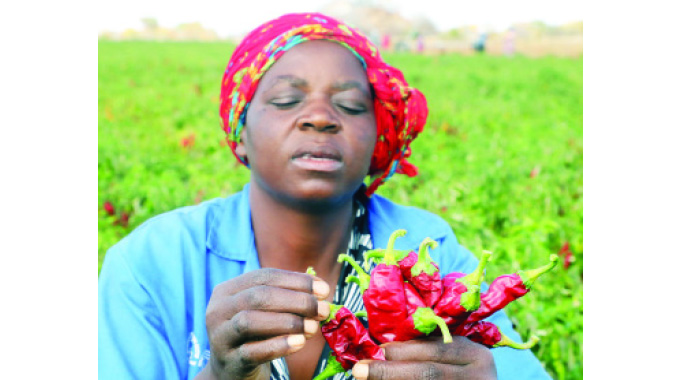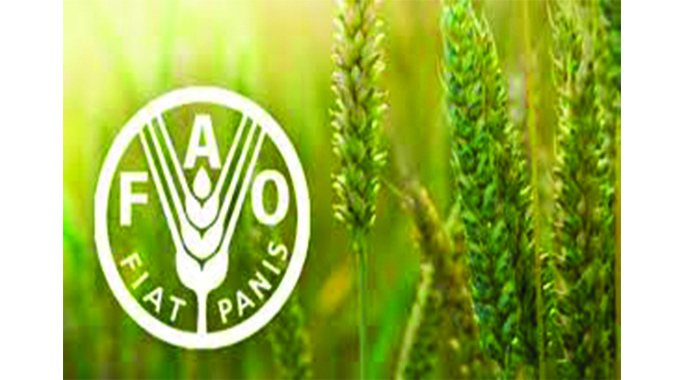Paprika brings smiles to Matebeleland South farmers

Mashudu Netsianda, Senior Reporter
LOCATED at Makakavhule Village in Beitbridge District in the semi-arid Matabeleland South Province, River Ranch Irrigation Scheme has transformed the lives of more than 80 smallholder farmers whose livelihoods have for the past two decades revolved around irrigation farming.
The irrigation scheme, which was established in the early 1970s and later refurbished at the turn of the 21st century, has transformed smallholders from subsistence to commercial farmers.
With a total of 83 farmers, comprising 56 females and 27 males, each farming on 0,5 hectares, River Ranch Irrigation Scheme has proved to be a game changer for the local community.
The irrigation scheme draws its water from Umzingwane River.
In the last 12 years, the River Ranch Irrigation Scheme underwent expansion from 41,5 hectares to 71 hectares under the Smallholder Irrigation Programme (SIP), a programme implemented by the Government in partnership with the Food and Agriculture Organisation (FAO) and other development partners.

Food and Agriculture Organisation (FAO)
SIP seeks to improve income, food and nutrition security of communal farmers involved in small-scale irrigation in Matabeleland South, Masvingo and Manicaland, which are some of the driest regions in the country.
The programme’s vision is to improve farmer welfare through the rehabilitation of irrigation infrastructure, capacity building, agribusiness development and pilot micro-catchments conservation initiatives.
Under SIP, 20 irrigation schemes in Manicaland and Matabeleland South provinces were rehabilitated to promote viable and sustainable irrigation development.
This benefitted 2 000 households as direct beneficiaries cultivating more than 1000 hectares of smallholder irrigation land.
In a report, (FAO) noted that irrigation is among the measures that can improve yields, reduce vulnerability to changing rainfall patterns and enable multiple cropping practices.
According to a recent United Nations report, the agriculture sector is the single largest employer in the world, sustaining the livelihood of 40 percent of the population, many of whom live in poverty.
Through hard work, commitment and dedication, the farmers at the 71-hectare River Ranch Irrigation Scheme have managed to unlock lucrative opportunities for themselves through farming paprika for the export market.
The paprika farming project is a joint effort involving several partners that include Cesvi, an Italian non-governmental organisation that has partnered Government in supporting rural communities’ transformation into commercial agriculture.
This is being achieved through modernisation of infrastructure, market approach and new management systems. Cesvi has linked the River Ranch Irrigation Scheme farmers to a South African market.
The plot holders are targeting to harvest about 400 tonnes from seven hectares and realising about US$10 000.
Each farmer is expecting to produce an average of five tonnes of paprika and they started harvesting yesterday.
The smallholder farmers at River Ranch Irrigation Scheme are defining the success farming story as they contribute significantly to food security for the nation in line with the Agriculture and Food System Transformation Strategy (2020-2025) whose national thrust is to see Zimbabwe achieving a US$8,2 billion agriculture economy by 2025.
The strategy, which was launched by President Mnangagwa last year in August is underpinned by growing the economy and ensuring Zimbabwe grows its own food and ensures the majority of rural families move from poverty to affluence.
Ms Tambudzani Dube, a widow, said she joined the irrigation scheme in 2017 and helped revive the farming project, which was on the verge of collapse.
A mother of five, Ms Dube said the irrigation scheme has helped her raise her children following the death of her husband.
She said the irrigation scheme has created a source of employment for locals, instead of having them crossing the border to neighbouring South Africa.
“I started farming at River Ranch Irrigation Scheme in 2017 soon after I lost my husband.
Since our village is situated near the border, at one time, I was tempted to cross to South Africa to work in the farms to fend for my children until I was persuaded by a neighbour to try farming,” he said.
“Today, I have no regrets because I am now earning a living through farming at the irrigation scheme and taking my children to school.
We have just started harvesting paprika at the fields and looking forward to selling to a South Africa market.”
Another farmer, Ms Sihlaleleni Jozani, a mother of four said she managed to modernise her home and electrified it through farming.
“I have been farming for the past five years and I managed to renovate my home and bought cattle and connected electricity at my homestead.
We started farming paprika last year as a demonstration exercise and this year, I am looking forward to harvesting at least 7 tonnes of paprika,” she said.

Despite water challenges due to constant power cuts, Mr Savious Ndou said they continue to register success in their farming business.
“We started farming paprika last year and it has helped us transform our lives.
We managed to buy livestock and take our children to school.
Despite being in a drought prone district, through irrigation farming, we have managed to produce wonders and with paprika farming, the sky is going to be the limit,” he said
“However, our major challenge is centred on power cuts due to load shedding and this affects the growth of our crops.
We hope that in future, we will be able to buy solar to power our engines.”
River Ranch Irrigation Scheme Agritex officer, Ms Leah Nare said the new approach of linking farmers to various markets after the rehabilitation of the irrigation scheme has helped farmers to get more income as they were now growing for a ready market.

“Farmers have started harvesting and are looking forward to harvesting more than 400 tonnes which translates to US$10 000 that will be shared among plot holders.
“The good thing is that they already have a market,” she said.
River Ranch was in 2000 affected by the Cyclone Eline induced floods.
“In 2002, that is when it was rehabilitated by the Government before it was extended six years later from 10 hectares to 20 hectares.
In 2010 it was further extended to 41,5 hectares by FAO.
In 2018, Cesvi further extended it to 71,5 hectares with 30 hectares under centre pivot,” said Ms Nare.
She said the entire 71,5 hectares is under crops, comprising sugar beans and winter wheat. Ms Nare said they are looking forward to extending the area of hectarage for paprika to 15 hectares.
Paprika, which belongs to the Capsicum annuum species has a variety of uses, including in food processing, flavouring and the pharmaceutical industry.
It is used as a condiment that is exported in its dried or ground form.
It is made from Capsicum annuum varieties, which include chilli peppers, but the peppers used for paprika tend to be milder and have thinner flesh.
The crop is mostly used in food colouring, meat canning, sauces, confectionery and as a base in seasoning applications.
There has been considerable growth in the use of paprika in cosmetics, perfumery, beverages, and pharmaceuticals.
As products that are deemed to have healthy benefits are growing in demand across the world, paprika is touted as having anti-inflammatory, anti-depression, and antioxidant properties.
These diversified applications of paprika reveal promising opportunities and markets across several sectors.
Currently, global demand for natural food colourants is growing, especially in wealthier countries, thus positioning paprika as a lucrative crop for farmers to grow in Zimbabwe.
The most popular paprika varieties grown by most farmers in Zimbabwe are Papriqueen or Papriking, a standard commercial seed variety for sweet paprika that is not only highly productive, but also developed for the drying and processing market.
Paprika can be grown in most parts of the country but the crop performs better in warmer areas with well drained soils.
– @mashnets.











Comments